NAZARETH—“You see them, you love them; they are human like you,” Shady Srour, writer and director of the film “Holy Air”, said about the movie’s two main characters, Adam and Lamia. “They are modern, they want to live.”
Srour is a self-described minority inside a minority. He grew up an Arab living in Nazareth.
He said he wanted to make a film to challenge the narrow, one-dimensional view of his city seen in the media and in films.
Srour said the oppression Adam and Lamia face living in Nazareth is not helping them to live, but they are not violent.
“We are Arab, but we are not terrorists,” Srour said.
Srour said the situation where he lives is very dynamic, and it moves very fast.
“You can’t feel it if you’re living abroad,” he said. “Every day there is something new.”
When Srour lived in the U.S. for his master’s of fine arts, he said he had a romantic view of his homeland, but once he returned he felt different.
“Holy Air”
After Srour completed his master’s of fine arts in 2004, he returned to Nazareth, got married and a year later his wife was pregnant; and he didn’t have a job.
“We had a mutual decision to have an abortion,” Srour said. “But you know how it is in a society that is conservative.”
He said after a week of “conspiring” about the fetus, he and his wife decided against the abortion.
It was then that Srour decided to make a documentary-style film about his life, and he unknowingly embarked on an 11 year endeavor to create the film.
It was difficult for Srour to get funding, and over the years, the story changed from a couple having a baby and immigrating from their homeland to a couple being stuck in their homeland.
In the amount of time Srour took to near the final stage of his story, his wife had another child; and he said 14 days into filming his third child was born.
Srour said there is a saying in Arabic about minorities trying to survive, which inspired the premise of “Holy Air.”
“What are we doing here, we’re selling air,” he said.
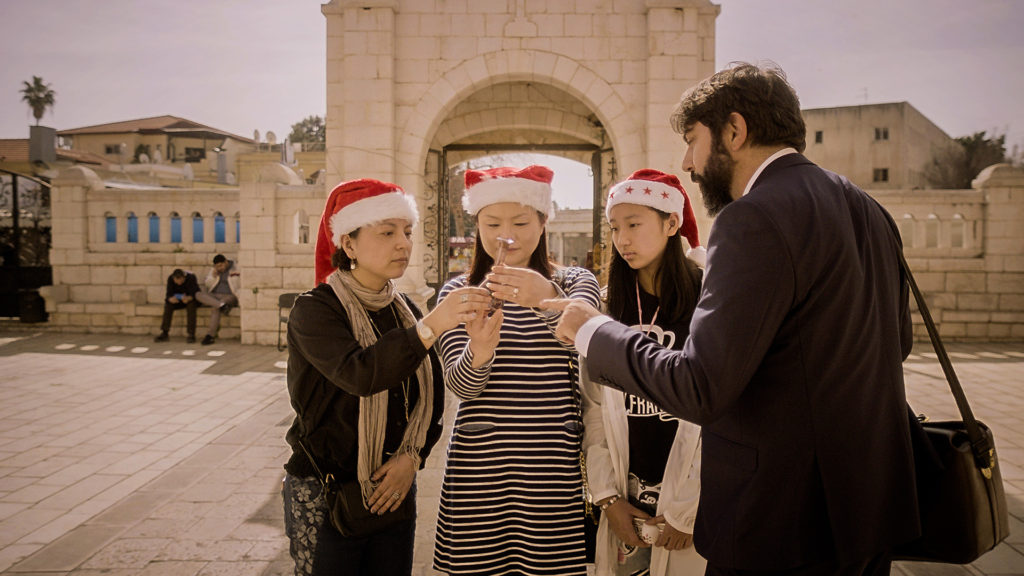
Shady Srour (R) plays Adam in his film “Holy Air.” All photos provided by Samuel Goldwyn FIlms
Srour said it was difficult to sell the film because people didn’t see the premise of selling air as believable. He also said it was difficult to get funding as an Arab.
At the start of the film, Adam (played by Srour) learns Lamia (Laëtitia Eïdo) is pregnant and the audience also learns his father is sick from cancer.
Adam becomes withdrawn and pensive; he feels his life has not amounted to much.
As a final attempt for success, Adam begins selling bottles he claims are filled with air from Mount Precipice, which is considered a holy place.
Srour said playing Adam came easy to him since he derived the character from his own experiences.
“You can say that it is ‘copy, paste,’” Srour said on who Adam is in the story.
Srour grew up hoping for peace at every life juncture; as does everyone in Nazareth, he said.
“I believe hope is dead, peace is dead,” he said. “How can we bring hope when we don’t really believe in it? It is like ‘Mission: Impossible.’”
Srour said this belief challenged him while making “Holy Air” because he wants his children to have hope and opportunity.
“I’m surviving,” he said. “I want to survive for my children. But I know as an Arab, as a Palestinian, a minority inside a minority, many of my dreams are dead.”
He said being a minority has limitations, but he doesn’t want this for his children.
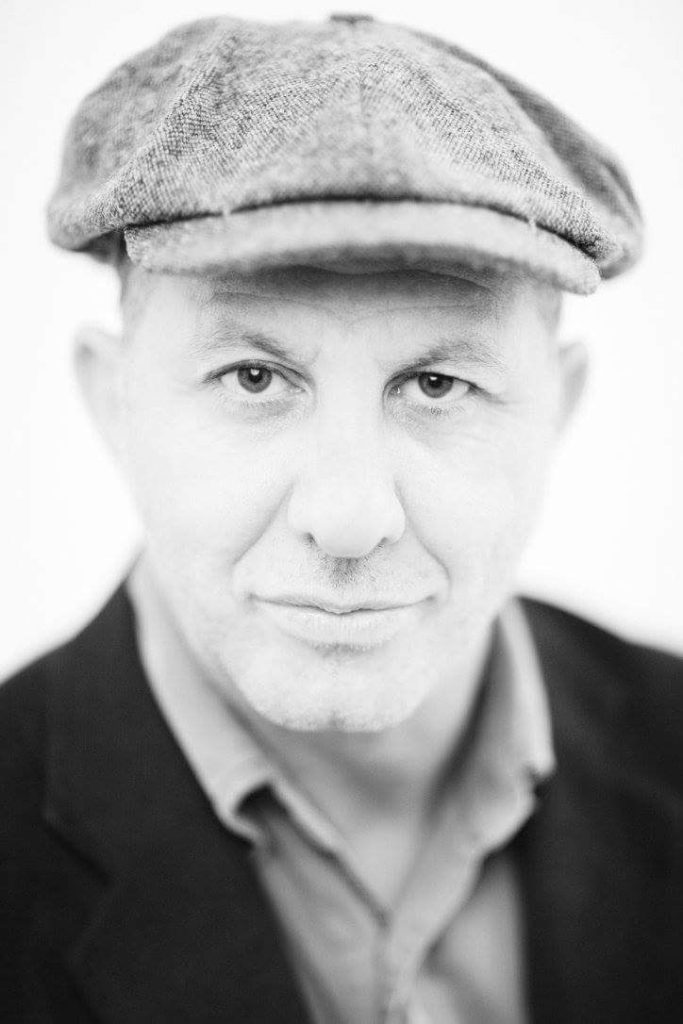
Producer Ilan Moskovitch. Photo provided by Sameul Goldwyn Films
Srour said Eïdo is half Lebanese, but she speaks French not Arabic.
“I taught her Arabic for four months for this film,” he said.
Lamia is shown to be an empowered and progressive Arab woman.
“She’s a very powerful, Palestinian, Arab woman,” Srour said. “We have women like that. You only get the bad and [the] very conservative woman. We have some women who don’t get much attention.”
Each relationship in the film has intimate moments.
There is humor, endearment, frustration. “Holy Air” is a poetic film.
The film was originally going to be shot in 40 days, but due to budgetary factors it had to be cut down to 17 days.
“We pay taxes, but we don’t get our rights,” Srour said.
Each scene was filmed with one shot because Srour feels this style is able to capture real life by making the film more believable. On the other hand, with more cuts to each scene, he feels the film becomes more technical.
Ilan Moskovitch, producer and casting director for “Holy Air”, said he met Srour by coincidence.
Moskovitch saw Srour in a play in Akko, a city in northern Israel.
After the play, Moskovitch shook Srour’s hand, told him he liked him and that he wanted them to work together.
Srour then told Moskovitch about “Holy Air.”
“I liked it a lot,” Moskovitch said. “He’s not into politics, he’s not social like me. I like the tone of the movie and of the script. I feel that it’s a personal story.”
Moskovitch said Srour depicted Nazareth well in the film and story. 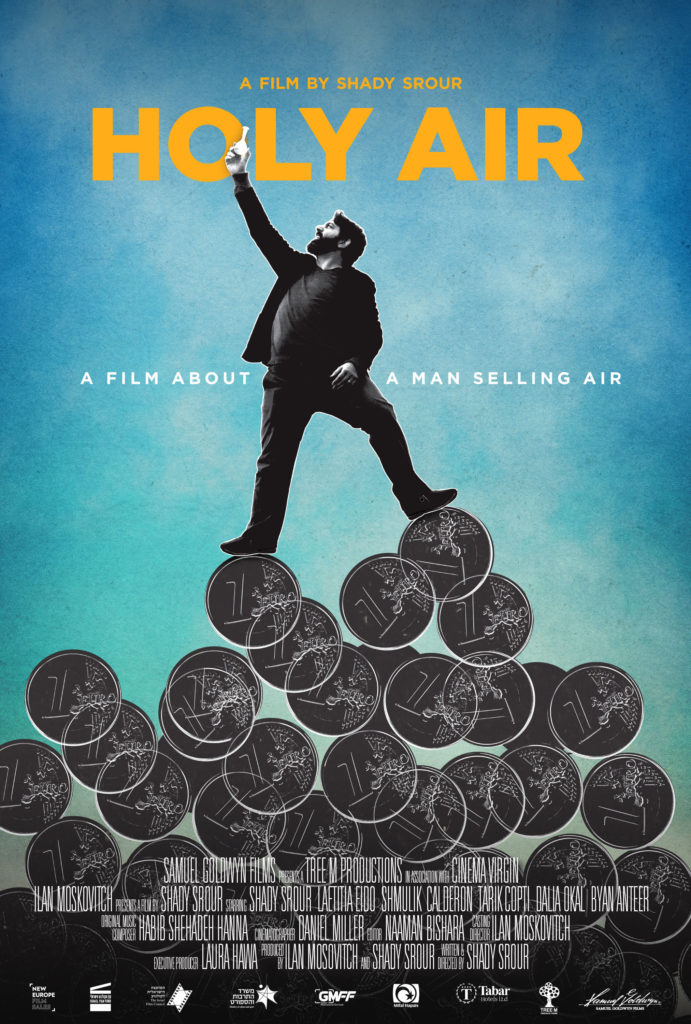
“It was great for me to work with him,” Moskovitch said. “He is very humble.”
Moskovitch was very hands-on for the film and helped develop the script.
As a filmmaker, Moskovitch is very interested in people who are marginalized in society.
He said before 1948, the land was majority Arab, but after that things changed and there wasn’t equality.
Moskovitch’s father was a Holocaust survivor and he recognizes that Akko was an ancient Arab city before his family moved there.
He grew up wanting equality and said he was sometimes against his father on the issue.
“I love my country and I love the people in my country,” Moskovitch said. “If it were to continue like this, it will become more and more dangerous in this area.”
Srour said Moskovitch has worked with him to fight for rights for marginalized people.


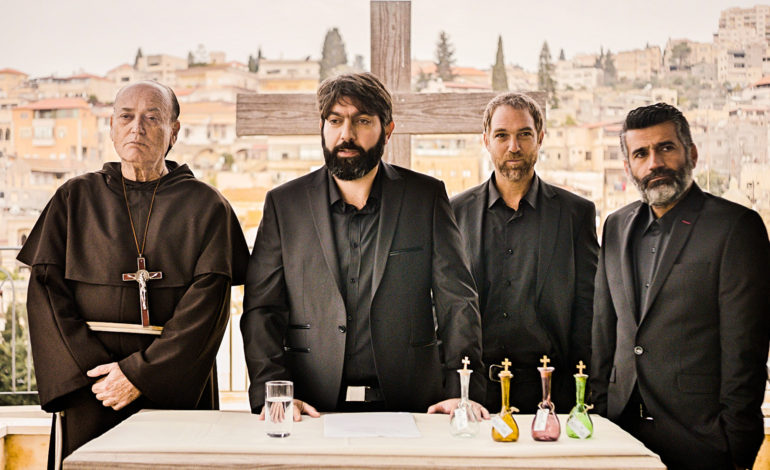

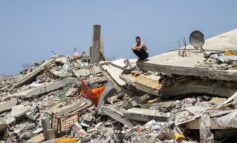

Leave a Reply